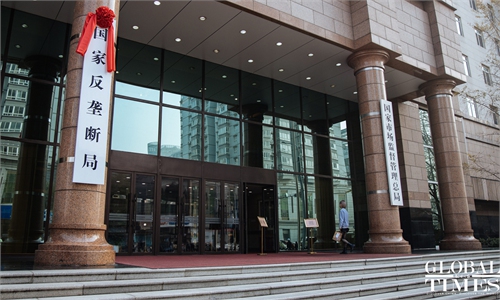
Photo:VCG
The 35th meeting of the 13th National People's Congress (NPC) Standing Committee voted on June 24 to amend the country's Anti-Monopoly Law which will take effect from August 1, 2022, Xinhua News Agency reported on Friday.
The revised law vows to establish and improve a fair competition review system, formulate and implement competition rules that are compatible with China's socialist market economy.
It also requires the nation's antitrust authorities to unify anti-monopoly enforcement to form an open, competitive, and orderly market system.
Analysts noted the implementation of the law marks a new era for the nation's antitrust enforcement and another major move to reasonably regulate the development of the platform economy amid China's rapidly growing digital industries.
The revised law will further regulate the overall platform economy with standardized rules, and major industry players can continue to evolve based on the principle of high-quality development while expanding in accordance with the law, Liu Dingding, a Beijing-based veteran market analyst, told the Global Times on Friday.
Liu said that the past development for the platform economy in China started off with rapid expansion which was not properly supervised, and that regulations often only caught up afterwards. He added that the implementation of the revised law now can ensure the industry as well as market entities develop at a fast pace under clear guidance.
Meanwhile, the amendment and implementation of the law will promote the sustainable development of domestic small- and medium-sized enterprises (SMEs), encouraging them to continuously innovate.
Previously, SMEs in the internet industry would be afraid of coming out with new innovations or ideas which might be mimicked by industry giants whereas SMEs might not be able to defend their rights, Liu said.
He added that as the major market entities, SMEs will be more actively seeking out new innovations, which is beneficial to boosting the market economy over the long run guaranteed by the revised Anti-Monopoly Law.
The draft amendment has further determined the application of relevant rules targeting the platform economy, such as operators can't use data, algorithms, technology, capital advantage and platform rules to engage in monopolistic practices, while also detailed more specific clarifications for different types of monopolistic behaviors, Yang Heqing, a spokesperson for the Legislative Affairs Commission of the NPC Standing Committee, said on June 16.
Following the implementation of the law, enterprises in the internet industry will be able to evenly develop and compete rather than forming new goliaths, Liu said.
The current Anti-Monopoly Law came into effect on August 1, 2008. The draft amendment was submitted to the 31st meeting of the 13th NPC Standing Committee in October, 2021, marking the first revision of the law since its implementation.
Global Times



